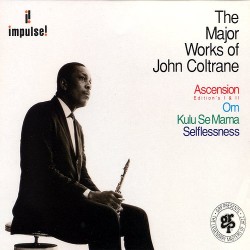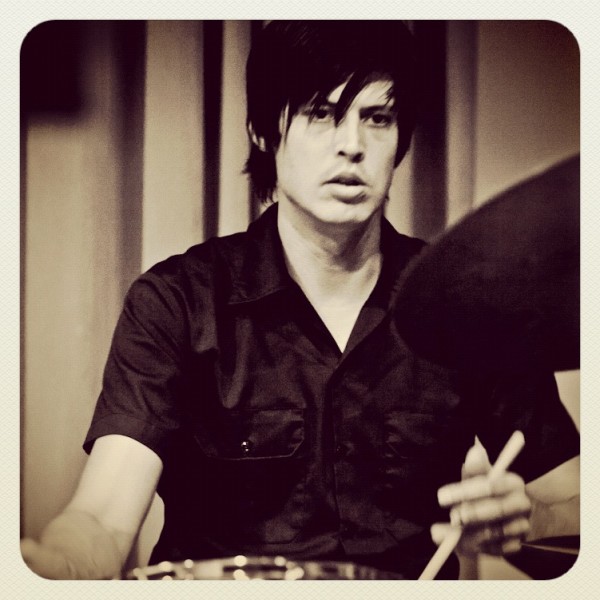[Photo by PETER GANNUSHKIN]
![]() BY ZIVIT SHLANK Percussionist and Composer Ches Smith is a multi-faceted creature of unwavering ambition. Born and raised in Sacramento, Ches’ curiosity with drums began in his teens learning the basics by copying his older brother and neighborhood rockers. His fascination with improvised music, spurred by his exposure to the Sacramento punk scene, led him to the otherworldly innovations of John Coltrane and Albert Ayler. Further inspired by the avant-garde noise of Sonic Youth, Ches immersed himself in punk/improvised music, and absorbed all that he could. He relocated to the Bay area in the mid 90s, and studied percussion at Mills College (Dave Brubeck’s alma mater) with the likes of Fred Frith. His first big assignment was as a sub for the band Mr. Bungle. That brief stint parlayed into a ubiquitous presence on the Bay area’s experimental rock landscape playing with Xui Xui and Secret Chiefs 3. He eventually switched coasts and transitioned onto NYC’s infamous jazz and experimental scene playing alongside Tim Berne, John Zorn and with Marc Ribot’s Ceramic Dog, among others. As of late he’s been stepping out on his own as leader with his genre-bending combos Good For Cows and These Arches featuring Mary Halvorson. Since 2005 Ches has been nurturing his solo project, Congs For Brums, a curious and dynamic mix of drums, vibes and effects that fuses free jazz vamps, heavy metal, noise and even some haunting classical elements into a fascinating whole. To close out Ars Nova Workshop’s 12th season, Ches’ Congs For Brums, along with the Chicago Underground Duo, will be performing tonight at the Philadelphia Art Alliance.
BY ZIVIT SHLANK Percussionist and Composer Ches Smith is a multi-faceted creature of unwavering ambition. Born and raised in Sacramento, Ches’ curiosity with drums began in his teens learning the basics by copying his older brother and neighborhood rockers. His fascination with improvised music, spurred by his exposure to the Sacramento punk scene, led him to the otherworldly innovations of John Coltrane and Albert Ayler. Further inspired by the avant-garde noise of Sonic Youth, Ches immersed himself in punk/improvised music, and absorbed all that he could. He relocated to the Bay area in the mid 90s, and studied percussion at Mills College (Dave Brubeck’s alma mater) with the likes of Fred Frith. His first big assignment was as a sub for the band Mr. Bungle. That brief stint parlayed into a ubiquitous presence on the Bay area’s experimental rock landscape playing with Xui Xui and Secret Chiefs 3. He eventually switched coasts and transitioned onto NYC’s infamous jazz and experimental scene playing alongside Tim Berne, John Zorn and with Marc Ribot’s Ceramic Dog, among others. As of late he’s been stepping out on his own as leader with his genre-bending combos Good For Cows and These Arches featuring Mary Halvorson. Since 2005 Ches has been nurturing his solo project, Congs For Brums, a curious and dynamic mix of drums, vibes and effects that fuses free jazz vamps, heavy metal, noise and even some haunting classical elements into a fascinating whole. To close out Ars Nova Workshop’s 12th season, Ches’ Congs For Brums, along with the Chicago Underground Duo, will be performing tonight at the Philadelphia Art Alliance.
PHAWKER: Who or what got you on the path to making improvised music?
CHES SMITH: I started playing with some bands in my teens in Sacramento where I’m from. There was this scene of punks that for some reason were really into Coltrane and especially free improvising and jazz like Albert Ayler among others. The first record I bought by Coltrane was Om and it’s pretty out there, super free playing. As far I could tell, there was no thematic melody; it was just something else. I didn’t really know about Trane’s past before that record, and I was blown away like “Wow, this is Coltrane? I had no idea!” In the early 90s, there were bands like Sonic Youth that were into free jazz and they had stuff that was pretty noisy and atonal at times. I’d see groups of punk bands and noise bands that would get together and do sets of just improvised music. I didn’t know what the hell was going on at first, but I kinda liked it. That’s what the scene was into and I looked up to all those people. The bands I played in had people more my own age, and we’d just get together and spend a lot of time just jamming if you can call it that (laughs).
PHAWKER: Let’s talk about your solo project Congs For Brums. First and foremost I have to ask you where did the name come from?
CHES SMITH: It was a misspelling of ‘songs for drums’. Misspelling is an important part of how I write and play.
PHAWKER: You’ve played with a number of amazing musicians including Marc Ribot and Nels Cline. Why did you decide to take on Congs For Brum as a solo project as opposed to making it a collaborative effort?
CHES SMITH: I’ve been doing this since 2005, and it started off with just drums and vibraphone. When I joined Marc Ribot’s band, he and Shahzad initially pushed me into using electronics. Marc thought there needed to be another voice like that coming from the drums, like an expanded drum set. So then I did some tours with my first, self-titled Congs For Brums record, and I started to wonder what it would sound like with electronics. I explored that further with my second album, Noise to Men. With this latest CD, Psy-cho Predictions, it’s an extension of the last album. It was all played live and I feel it’s way more integrated. I wrote a piece that’s 43 minutes long with drums, electronics and vibes, and I’ll be playing some version of that piece at the Art Alliance on Monday. Just having a solo project was something I always wanted to do. Solo drum work has been something I’ve been doing since the late 90s. It’s just such a challenge for me on every level as an improviser both compositionally and even psychologically (laughs). I actually enjoy it now, but for a long time I really hated playing solo and that’s why I kept doing it because it was terrifying. I feel like with every gig, even if it didn’t feel like a successful one, it’s really helped me grow as a person. The reason I do solo stuff is mostly for personal growth. It’s a challenge to play a whole set and improvise totally alone and to keep my head together (laughs). Playing in front of people, as opposed to alone in my practice room, is the only way to do it; it raises the level of intensity.
CONGS FOR DRUMS PERFORMS TONIGHT @ THE ART ALLIANCE TONIGHT W/ CHICAGO UNDERGROUND DUO

